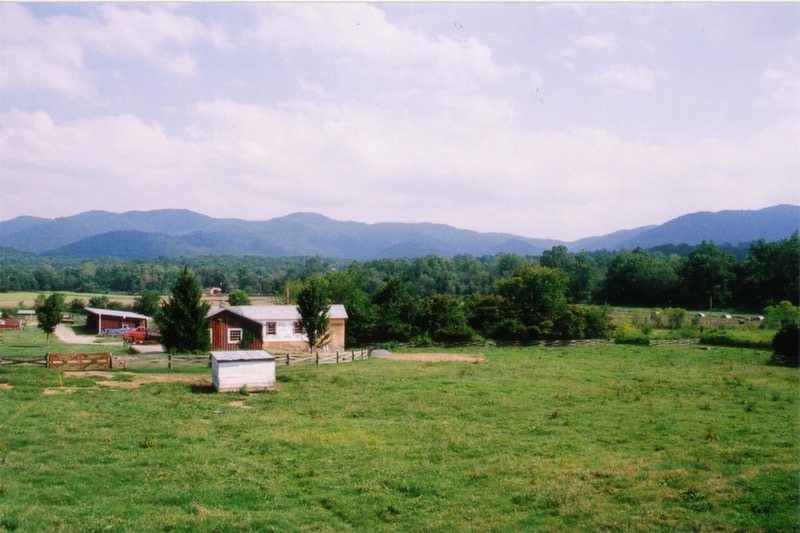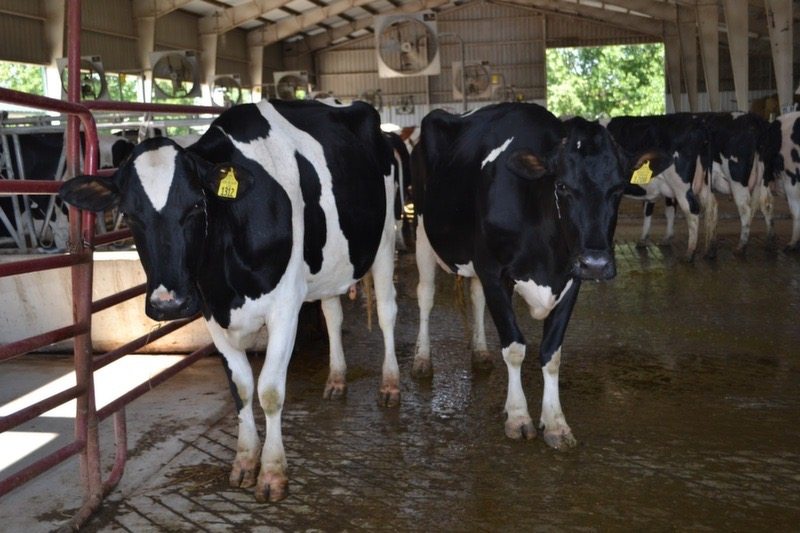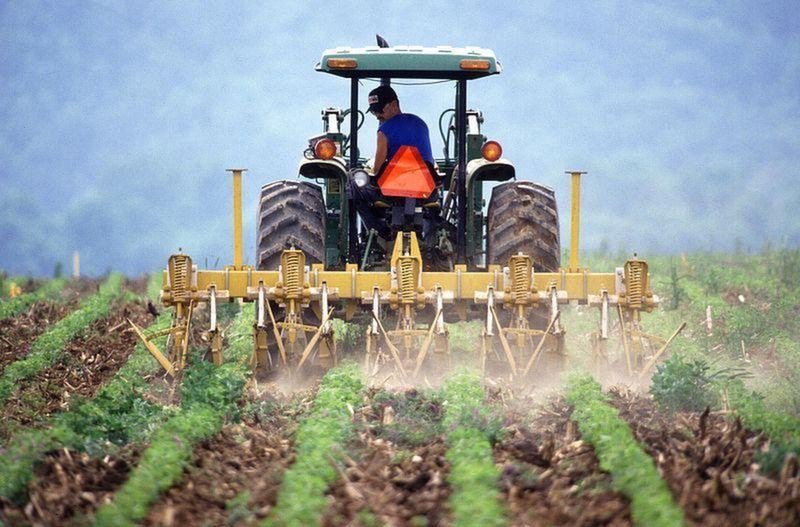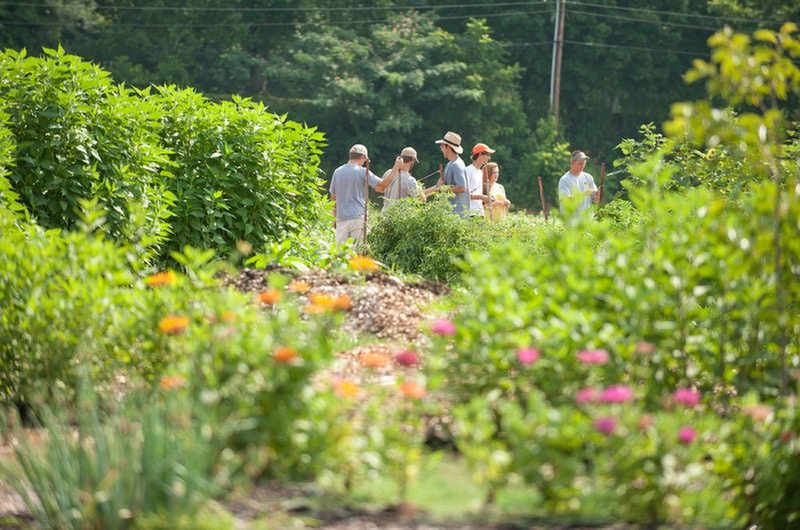From small student-run organic farms, to large agribusiness training centers and entrepreneurial programs, farming plays a central role in many American higher ed institutions. To highlight this unique offering, we’ve surveyed over 50 schools to come up with a list of the best university farms in America. We realize that a university farm can mean a number of things, and so as not to compare apples and oranges (literally), we’ve taken the following criteria into account:
Ranking Criteria:
- Farm Size
- Integration with the Main Campus
- Sustainability
- Are courses taught at the farm?
- Do students use the farm?
- Integration with the community
1. Warren Wilson College
Warren Wilson College is a national liberal arts college structured around values perfectly manifested in the soil. To graduate, students must work through “the Triad” of Warren Wilson experience, including work, service, and academics. Warren Wilson is one of only seven federally-recognized work colleges in the nation, where the daily operations of the school are partially completed by the students. Many students choose to work on the farm, which is located on 275 acres divided into 25 fields in the scenic Swannanoa Valley. Beef cattle and hogs make up a majority of the livestock, and are sold locally. Additionally, a CSA and farmer’s market provide produce from the farm to the local community. A crew was established 14 years ago to grow medicinal herbs and make medicine from them. A bee crew and an heirloom apple orchard are also present on the farm. The farm strives to practice sustainable agriculture, and is “grass-based,” allowing steers to graze on a natural “salad bar” that translates into
healthier meat for humans.
- Crops Grown: Mixed Crops, Livestock
- Homepage
2. College of the Ozarks
The College of the Ozarks utilizes educational student labor through a number of agricultural work stations, including: beef farms, a farmer’s market, dairy farm, feed mill, hog farm, horticulture lab, orchard, garden, processing plant, and the agronomy station. The largest project includes a yearly workshop put on for FFA (the Future Farmer’s of America), in which an educational workshop is distributed to nearly 2,000 attending members. A number of student organizations supplement the agriculture-centered experience at College of the Ozarks, including the AG Ed Club, Ozark Fisheries & Wildlife Association, Horticulture Club, Collegiate Farm Bureau Aggie Club, and Delta Tau Alpha, a selective national agriculture honor society. An average of 80 students work at agriculture workstations throughout the year.
- Crops Grown: Mixed Crops, Fruits, Livestock
- Homepage
3. Deep Springs College
Deep Springs College is a liberal arts college located on an alfalfa farm and cattle-ranch in the California high desert. The school was founded with the three guiding notions of academics, labor, and self-governance, important values for the farm. The school only has 26 students, but provides full scholarships valued at over $50,000 per year for two years. After two years, many students continue to prestigious schools. Farm-based locations for the labor component of the program include the organic Deep Springs Garden, which includes a fruit orchard, greenhouse, chicken coop, and vegetable beds, the 300-head cattle ranch, and the 152 acres of alfalfa fields, used to feed the college’s cattle and livestock. Every seven weeks, students are assigned a labor position, including options like student cowboy and butcher.
- Crops Grown: Mixed Crops, Fruits, Livestock
- Homepage
4. Hampshire College
Hampshire College is a prestigious and experimental school established in 1965. During their time at Hampshire, student focus on portfolios rather than distribution requirements, and narrative evaluations take the place of grades. Though young, the school’s farming program is longer established than most, created in the late 1970’s by natural science faculty. The farm is over 100 acres, offers work study programs, independent study opportunities, and internship opportunities. Largely thanks to the campus farm, Hampshire College is well on their way to sourcing 100% of their food locally. The farm is also a CAS (community-supported agriculture) program, allowing locals to pick up produce weekly.
- Crops Grown: Livestock, honey, syrup, dairy, hay
- Homepage
5. Butte College
Butte College, a community college near Chico (CA), offers an 80-acre farm including an organic fruit orchard and vineyard. The institution has a long history of sustainable agriculture, offering training in sustainable agriculture, and establishing a portion of the farm as organic certified as far back as 1990. The College is also home to the first organic dairy west of the Mississippi. A number of student organizations including the Ag Ambassadors Club and the Symbiotic Solutions clubs augment the existing academic farm-based offerings. Community access to the farm is available, including (in the past) portions of the farm joining the Sierra Oro Farm Trail Passport Program, a local weekend where local vineyards and farming operations show off their wares to local hikers.
- Crops Grown: Wine, Livestock, Mixed Crops
- Homepage
6. College of the Atlantic
Beech Hill Farm at College of the Atlantic is a 73-acre farm located on a ridge of deep glacial till soils. Located on Mount Desert Island off the coast of Maine, the farm offers an insight-filled addition to the academic offerings at the College of the Atlantic, namely, the single major of the college: human ecology. A full range of MOFGA Certified organic vegetables are farmed, with 80% sold to local visitors through the on-site farm stand. The farm also produces honey, preserves, meat, eggs, dairy products, baked goods, fruits, and gourmet specialty foods.
- Crops Grown: Fruits, Mixed Crops, Livestock
- Homepage
7. UC Santa Cruz
UC Santa Cruz is known for one of the nation’s premier farming apprenticeship programs. USSC’s farming experience centers around 2 plots, the Chadwick Garden, which utilizes the “French Intensive/biodynamic” method, where plants are closely spaced and on raised beds, as well as the 25-acre farm, where both hand worked and tractor cultivated row-crops are placed. Both plots are organic certified, and well established, being established in 1967 and 1971, respectively. The Life Lab, is an additional educational opportunity that helps to develop garden-based science and nutrition curricula for elementary schools as well as manages a model school garden and training site.
- Crops Grown: Mixed Crops, Fruits
- Homepage
8. Michigan State University
Michigan State University offers a 15-acre year-round teaching and production farm that is organic certified. Production is carried out by students in the SOF Farm Crew, students from the 9-month Organic Farmer Training Program (OFTP), and volunteers. Produce is available 48 weeks of the year through the community supported agriculture program (CSA), as well as stands on the MSU campus throughout 7 months of the year, or through MSU dining halls. Production is diversified and includes vegetables, livestock, flowers, fruits, and herbs.
- Crops Grown: Mixed Crops, Fruits, Herbs, Livestock
- Homepage
9. Clemson University
Clemson’s Student Organic Farm was granted 15 acres of the Calhoun Field Laboratory in 2001, and organic certified in 2005, not using any synthetic fertilizers or pesticides. The farm is interdisciplinary, offering opportunities for everything from creative inquiry projects to graduate research, and the farm relies heavily on student involvement in all aspects of farm management, production and marketing. Along with experiential learning, the farm focuses on the production of high value vegetables, small fruit, herbs, and cut flowers which may be purchased through the farms Campus Supported Agriculture program, and local farmer’s markets.
- Crops Grown: Fruits, Mixed Crops, Flowers
- Homepage
10. California Polytechnic State University
The 11-acre production farm at Cal poly State is certified organic, and provides a place where undergraduate students can get hands-on experience in organic and sustainable farming and gardening practices. The farm is jointly managed by students, faculty, and staff, and produces dozens of varieties of vegetables that are sold locally or given to the Food Bank. Students may become involved through “enterprise projects,” which center on direct participation in production, care, harvesting and marketing organic vegetables. Currently the farm is supported by the Horticulture and Crop Science Department, the College of Agriculture, Food and Environmental Sciences, local sales, and through grants and donations.
- Crops Grown: Mixed Crops
- Homepage
11. Evergreen State College
Evergreen State University’s entire campus serves as a natural laboratory, and as natural inspiration. The Organic Farm can be reached through two trails through the campus forest, and is on a 5-acre plot that currently produces fruit, vegetables, chickens, eggs, and sheep. Alongside staff, student farm aides, and faculty, the farm is supported by students enrolled in the interdisciplinary program Practice of Organic Agriculture, who work as farm interns. The entire plot is both organic certified and salmon safe. Produce may be obtained through a 32-member community supported agriculture (CSA) program. Other farm-related locations on campus include the Sustainable Agriculture Lab, the Community gardens, and Demeter’s Gardens.
- Crops Grown: Mixed Crops, Sheep, Poultry
- Homepage
12. UC Davis
UC Davis has housed two gardens–a market garden focusing on practical experience in organic vegetable production, and an ecological garden for reaching ecological horticulture–for over 30 years. There are a number of ways to get involved with the 7-acre market garden, from volunteering, to interning for credit, as a full-time student employee, or using the land for an independent student project. During the summer, both students and non-students help on the farm, and there are apprenticeship opportunities. Produce is sent to UC Davis Dining Services as well as sold at the UC Davis Farmers Market, and a community-supported agriculture project known as Student Harvest.
- Crops Grown: Mixed Crops
- Homepage
13. Western Washington University
“The Outback” at Western Washington University is a 5-acre farm and wetland restoration site offering opportunities for personal or collaborative projects in habitat restoration, organic farming, green building, workshops, and independent study projects and classes. There are a range of capacities in which students can become involved, from volunteering to salaried employment. Plots in the community garden are available free of charge to students, staff, faculty, and community members. While the educational and forest gardens focus on larger scale production projects, other notable farm-related locations include the herb and ethnobotany garden, wetlands, outdoor classrooms/amphitheater, and greenhouses.
- Crops Grown: Mixed Crops
- Homepage
14. Central Carolina Community College
Central Carolina Community College is a pioneer in the teaching of sustainable agriculture among community colleges. Notable agriculture-related programs at CCCC include a number of certificates, including: agricultural sustainability, sustainable livestock systems, and sustainable vegetable production. The main degree offered is an Associates in sustainable agriculture, with the option for students to work on creating a plan for their own sustainable farm. The 5-acre organic plot includes a greenhouse, student-built barn (including a pole barn, packing shed, and a masonry pizza oven). Another notable factor of the academic program includes the use of successful farmers as the main instructors, with a number of field trips to local farms and agribusinesses.
- Crops Grown: Mixed Crops
- Homepage
15. Yale University
The Yale Sustainable Food program sees food as an opportunity to engage with the world around us, using farming and food as a way to tackle important questions in an interdisciplinary, creative, and critical way. The program is the steward of two farms, including the Yale Farm, a one-acre plot on Yale’s main campus that grows crops 12 months a year, with sessions extended through the use of passively heated high tunnels. Students, faculty, staff, and New Haven community members are welcome to join in on work on the farm, with internships open to those from around the world. The “Seed to Salad” program brings local primary and secondary school children to the farm during the fall and spring semesters. And don’t forget the West Campus Urban Farm, a relative newcomer on Yale’s West Campus that’s open to the community all the time.
- Crops Grown: Mixed Crops, Poultry
- Homepage
16.Duke University
Since 2010, the Duke Campus Farm has grown from a student project to a fully functioning farm that produces thousands of pounds of produce a year. The one-acre plot provides food for the campus dining halls as well as its community supported agriculture (CSA) group. Food Science courses are often at least partially presented in conjunction with visits to the farm, drawing students from a number of disciplines outside. Currently community workdays occur twice a week, and are open to everyone, from complete beginners to veteran farmers. The farm is located in the Duke Forest directly across from the Carolina Friends School.
- Crops Grown: Mixed Crops
- Homepage
17. Berea College
The Berea College Farm borders the Berea College campus and the City of Berea, consisting of almost 500 acres of pastures, cropland, gardens, woodlots and ponds. While not directly part of the farm, a further 8000 acres of forest owned by Berea College extends the living laboratory even farther. The Farm is one of the most highly diversified student educational farms in the country. Most if not all students in the Agriculture and Natural Resources Program work on the farm, and are expected to–for a time–work in every enterprise type, including: horticulture, field crops, pigs, cattle, goats, microlivestock, and marketing. Afterwards, students may hone in on what they really want to specialize in, often moving up to managerial positions by the time they graduate.
- Crops Grown: Mixed Crops, Livestock, Microlivestock
- Homepage
18. Berry College
Berry College is home to the nation’s largest campus (27,000 acres), a large portion of which is used as an outdoor laboratory for a variety of interdisciplinary projects. A large number of farm-related student projects are performed through the student-operated enterprises program, an innovative entrepreneurial education program in which students start their own businesses in conjunction with staff or faculty co-managers. Current farm-centered student-operated enterprises include an Angus beef operation, the Berry Bees (a bee hive-centered enterprise), the Genetics Enterprise, founded with the aim of developing an internationally recognized herd of registered jersey cattle, a Jersey Milk-centered enterprise, and programs centering on Berry grown produce and herbs.
- Crops Grown: Livestock, Herbs, Mixed Crops
- Homepage
19. Cal State Chico
California State University – Chico’s University Farm is the second largest surveyed, providing 800-acres of varied farmland supported by 15 full-time staff members and 35-40 students. Animal units include a beef unit, an organic dairy unit, sheep & goat unit, and a swine unit, and are operated by a staff technician, a lead student manager and three or four student employees. Other farm-related facilities include an irrigation training facility, greenhouses, row crops, orchards, an organic vegetable project, rose gardens, and an arboretum. The farm is also home to numerous professional seminars, as well as Future Farmers of America and 4-H field days.
- Crops Grown: Livestock, Mixed Crops, Flowers
- Homepage
20. University of New Hampshire
The University of New Hampshire hosts a number of research and organic farms, including two horticulture and agronomy farms, a New England Holstein dairy, an organic dairy farm, and research greenhouses. The large variety of sites are a crucial part of the University’s land grant heritage, with some elements of agricultural education dating back to 1887. The community is able to use facilities–particularly the Kingman Farm–for hiking, mountain-biking, and other recreational activities. While spread out throughout several locations, the combined farm-related space is the largest in our rankings. Farming at the University of New Hampshire is more academically centered than at many of the institutions on our list, with funding provided for a large amount of research. On average, scientists at the University of New Hampshire manage an average of 50 research projects at any one time.
Source: Best College Reviews































